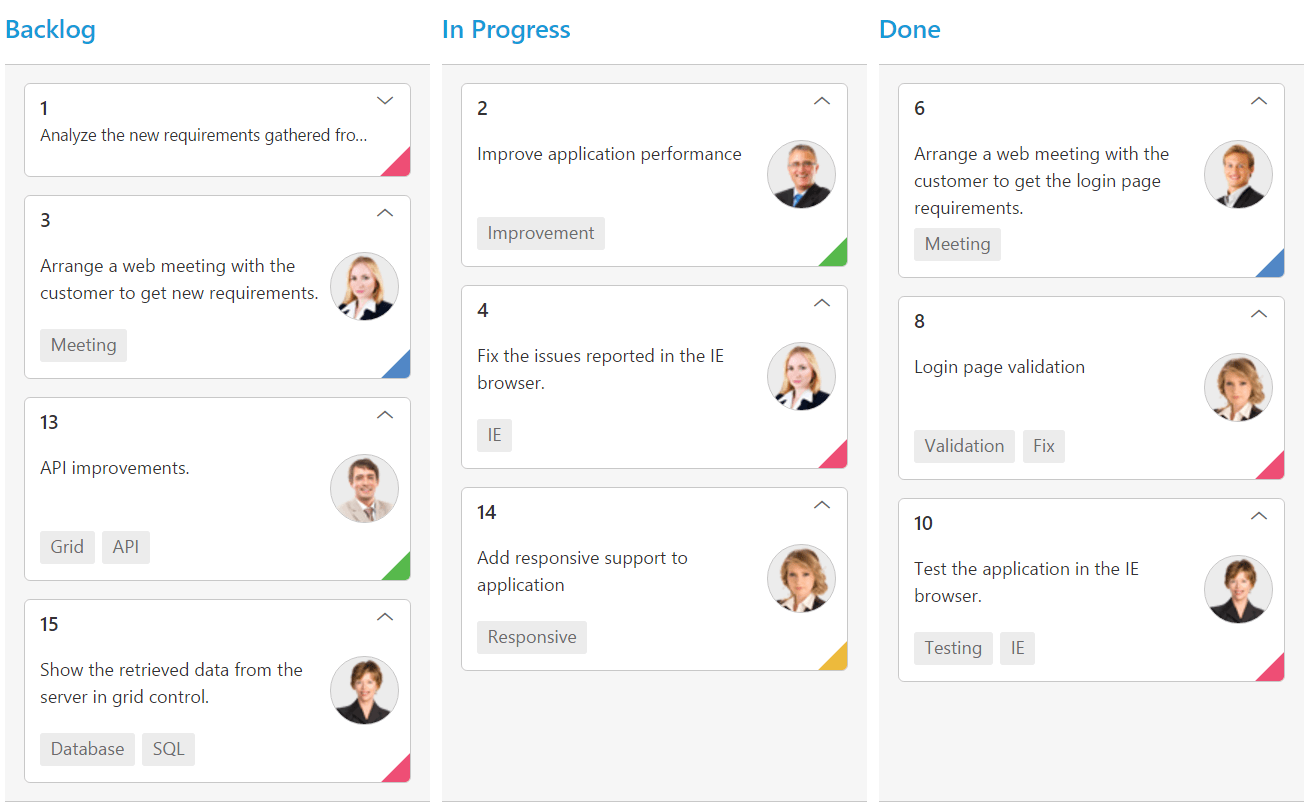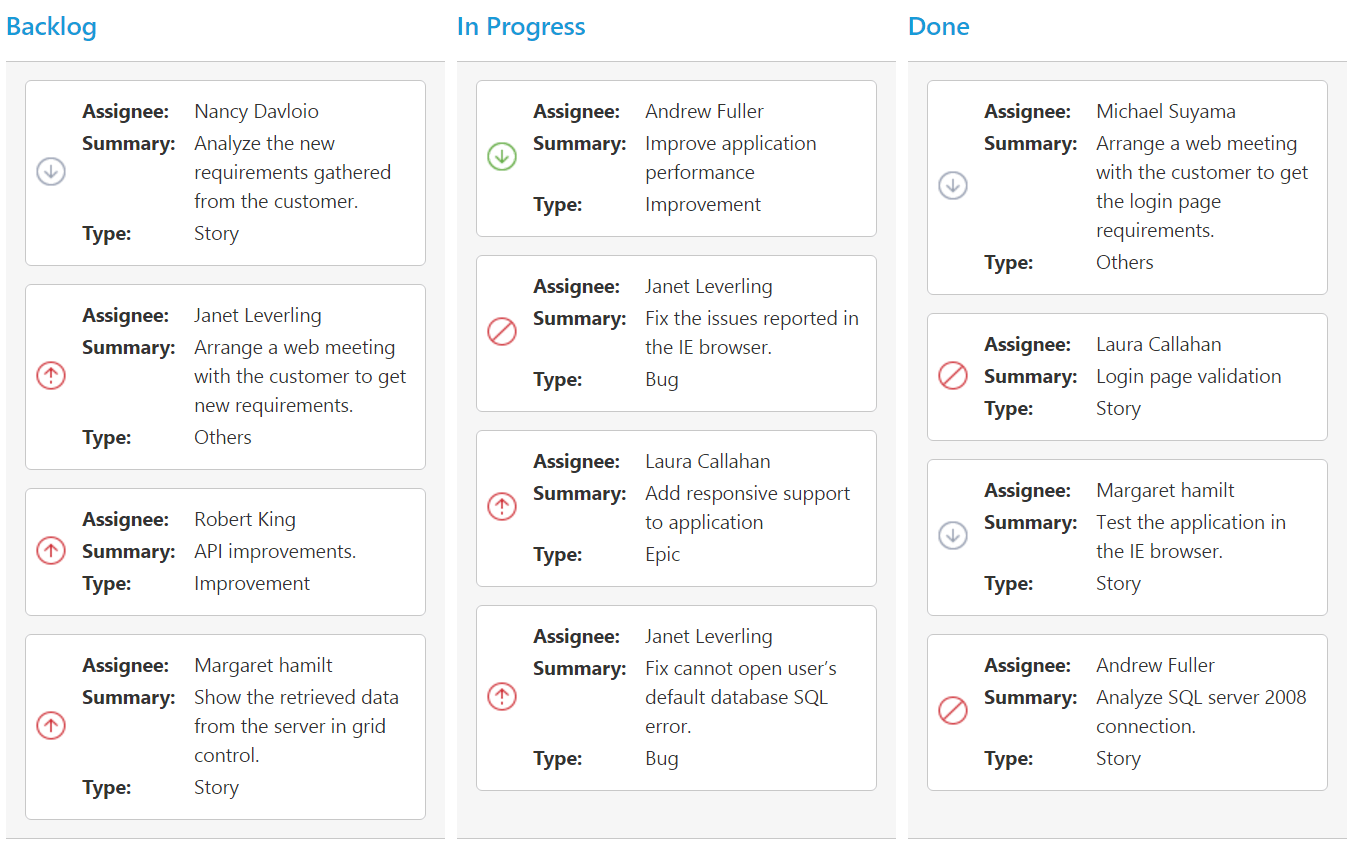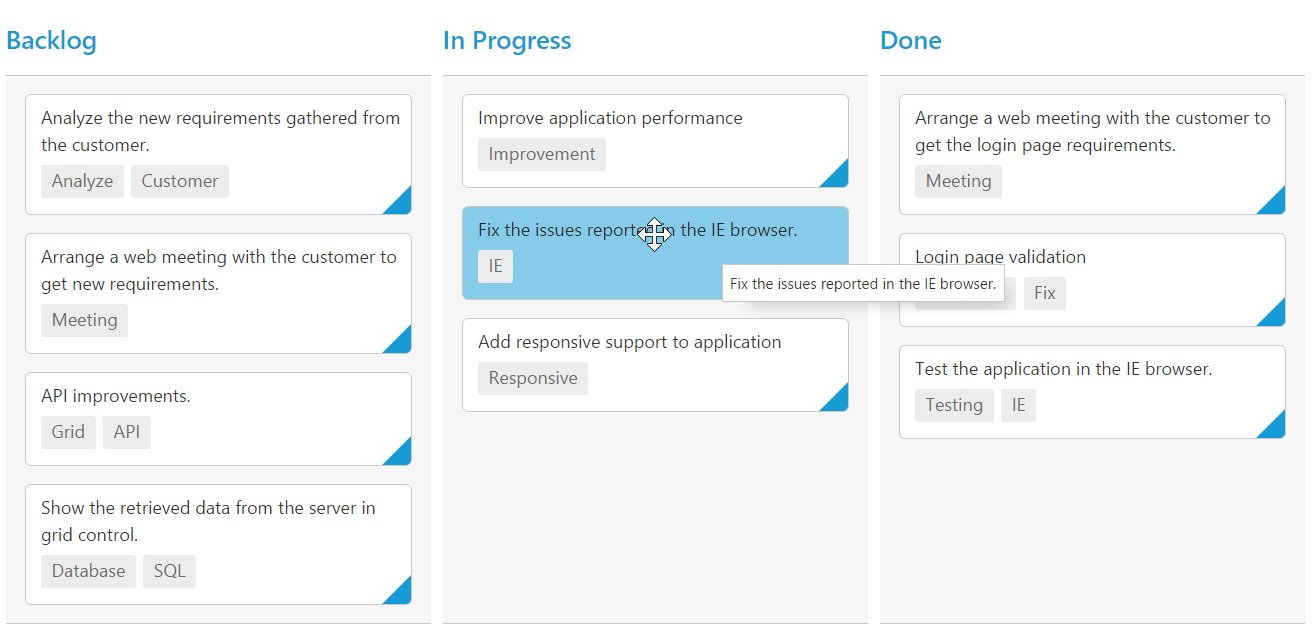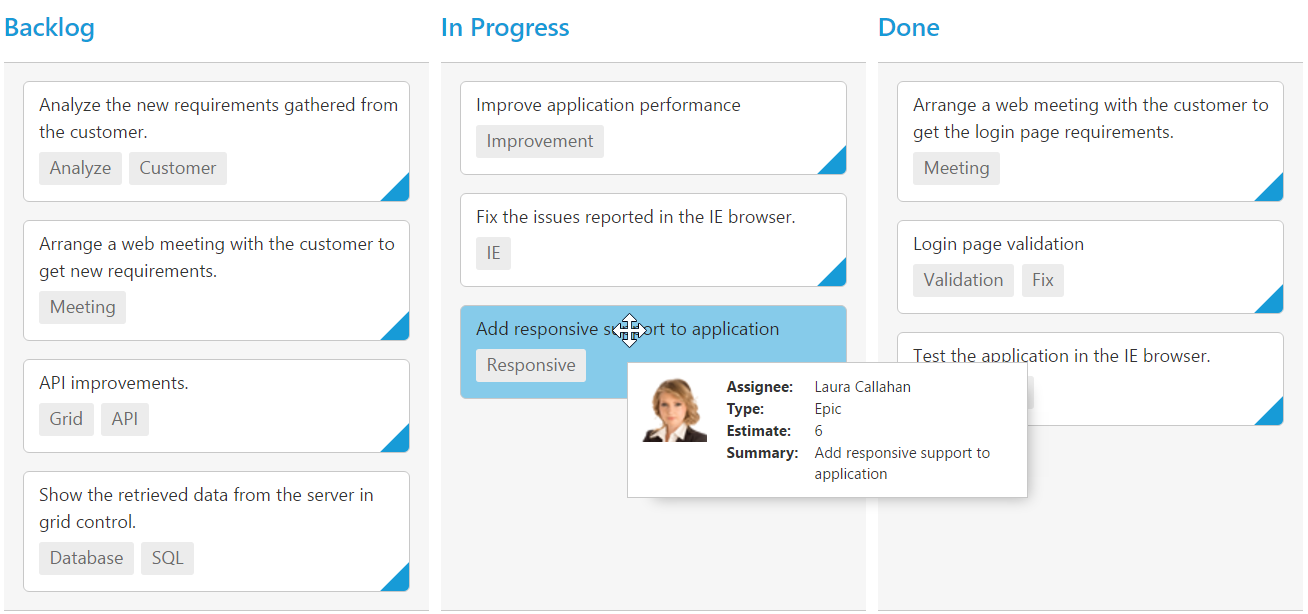Cards support in ReactJS Kanban
22 Jul 202219 minutes to read
Customization
Cards can be customized with appropriate mapping fields from the database. The customizable mapping properties are listed as follows
| Mapping Fields | Description |
|---|---|
| Map the column name to use as content to cards. | |
| Map the column name to use as tag. Multiple tags can be given with comma separated. E.g. "API","SQL, Database". | |
| Map the column name to use as colors to highlight cards left border. | |
| Map the colors to use with column values which is mapped with `fields-color`. | |
| Map the column name to use as image to cards. | |
| Map the column name to use as primary key to cards. | |
| Map the column name to use as priority to cards. | |
| Map the column name to use as title to cards. Default title is `primaryKey`. | |
| Set as true to enable title for card. |
The following code example describes the above behavior.
var data = ej.DataManager(window.kanbanData).executeLocal(ej.Query().take(20));
var colormap = {
"#cb2027": "Bug,Story",
"#67ab47": "Improvement",
"#fbae19": "Epic",
"#6a5da8": "Others"
};
ReactDOM.render(
<EJ.Kanban dataSource={data} keyField="Status" fields-content="Summary" fields-primaryKey="Id" fields-priority="RankId" fields-tag="Tags" fields-color="Type" fields-imageUrl="ImgUrl" cardSettings-colorMapping={colormap} allowTitle={true}>
<columns>
<column headerText="Backlog" key="Open"></column>
<column headerText="In Progress" key="InProgress"></column>
<column headerText="Done" key="Close"></column>
</columns>
</EJ.Kanban>,
document.getElementById('kanbanboard-default')
);The following output is displayed as a result of the above code example.

Template
Templates are used to create custom card layout as per the user convenient. HTML templates can be specified in the template property of the cardSettings as an ID of the template’s HTML element.
You can use JsRender syntax in the template. For more information about JsRender syntax, please refer this link.
The following code example describes the above behavior.
<div id="kanbanboard-default"></div>
<script src="app/kanbanboard/default.js"></script>
<script id="cardtemplate" type="text/x-jsrender">
<table class="e-templatetable">
<colgroup>
<col width="10%">
<col width="90%">
</colgroup>
<tbody>
<tr>
<td class="photo">
<img src="content/images/kanban/.png">
</td>
<td class="details">
<table>
<colgroup>
<col width="10%">
<col width="90%">
</colgroup>
<tbody>
<tr>
<td class="CardHeader"> Assignee: </td>
<td></td>
</tr>
<tr>
<td class="CardHeader"> Summary: </td>
<td></td>
</tr>
<tr>
<td class="CardHeader"> Type: </td>
<td></td>
</tr>
</tbody>
</table>
</td>
</tr>
</tbody>
</table>
</script>
<style type="text/css">
.e-templatetable {
width: 100%;
}
.details >table {
margin-left:2px;
border-collapse: separate;
border-spacing: 2px;
width: 100%;
}
.details td {
vertical-align: top;
}
.details {
padding: 8px 8px 10px 0;
}
.photo {
padding: 8px 6px 10px 6px;
text-align: center;
}
.CardHeader {
font-weight: bolder;
padding-right: 10px;
}
</style>var data = ej.DataManager(window.kanbanData).executeLocal(ej.Query().take(20));
var colormap = {
"#cb2027": "Bug,Story",
"#67ab47": "Improvement",
"#fbae19": "Epic",
"#6a5da8": "Others"
};
ReactDOM.render(
<EJ.Kanban dataSource={data} keyField="Status" fields-primaryKey="Id" fields-color="Type" cardSettings-template="#cardtemplate" cardSettings-colorMapping={colormap} allowTitle={true}>
<columns>
<column headerText="Backlog" key="Open"></column>
<column headerText="In Progress" key="InProgress"></column>
<column headerText="Done" key="Close"></column>
</columns>
</EJ.Kanban>,
document.getElementById('kanbanboard-default')
);The following output is displayed as a result of the above code example.

Tooltip
You can enable HTML tooltip for Kanban card elements by setting enable property as true in tooltipSettings.
The following code example describes the above behavior.
ReactDOM.render(
<EJ.Kanban dataSource={data} keyField="Status" fields-content="Summary" fields-primaryKey="Id" fields-tag="Tags" tooltipSettings-enable={true}>
<columns>
<column headerText="Backlog" key="Open"></column>
<column headerText="In Progress" key="InProgress"></column>
<column headerText="Done" key="Close"></column>
</columns>
</EJ.Kanban>,
document.getElementById('kanbanboard-default')
);The following output is displayed as a result of the above code example.

Template
By making use of template feature with tooltip, all the field names that are mapped from the dataSource can be accessed to define the tooltipSettings-template tooltip for card. The tooltipSettings-enable must be enabled first.
The following code example describes the tooltip template.
<script id="tooltipTemp" type="text/x-jsrender">
<div class='e-kanbantooltiptemplate'>
<table>
<tr>
<td class="photo">
<img src="">
</td>
<td class="details">
<table>
<colgroup>
<col width="30%">
<col width="70%">
</colgroup>
<tbody>
<tr>
<td class="CardHeader">Assignee:</td>
<td></td>
</tr>
<tr>
<td class="CardHeader">Type:</td>
<td></td>
</tr>
<tr>
<td class="CardHeader">Estimate:</td>
<td></td>
</tr>
<tr>
<td class="CardHeader">Summary:</td>
<td></td>
</tr>
</tbody>
</table>
</td>
</tr>
</table>
</div>
</script>
<style>
.details >table {
width: 100%;
margin-left:2px;
border-collapse: separate;
border-spacing: 1px;
}
.e-kanbantooltiptemplate {
width: 250px;
padding: 3px;
}
.e-kanbantooltiptemplate > table {
width: 100%;
}
.e-kanbantooltiptemplate td {
vertical-align: top;
}
td.details {
padding-left: 10px;
}
.CardHeader {
font-weight: bolder;
}
</style>var data = ej.DataManager(window.kanbanData).executeLocal(ej.Query().take(20));
ReactDOM.render(
<EJ.Kanban dataSource={data} keyField="Status" fields-content="Summary" fields-primaryKey="Id" fields-tag="Tags" tooltipSettings-template="#tooltipTemp" tooltipSettings-enable={true}>
<columns>
<column headerText="Backlog" key="Open"></column>
<column headerText="In Progress" key="InProgress"></column>
<column headerText="Done" key="Close"></column>
</columns>
</EJ.Kanban>,
document.getElementById('kanbanboard-default')
);The following output is displayed as a result of the above code example.
